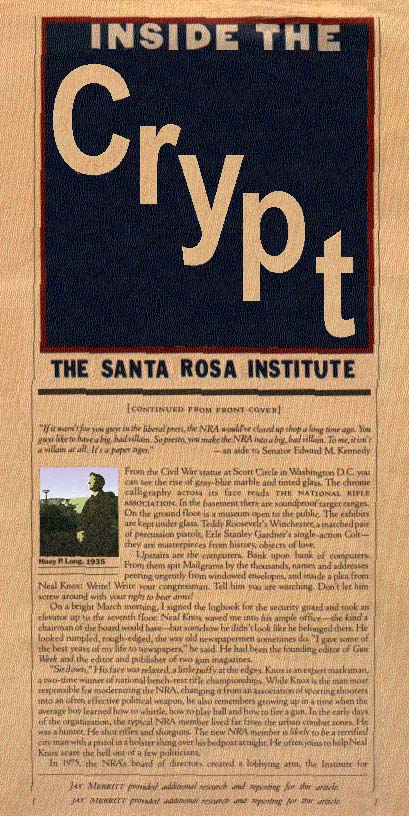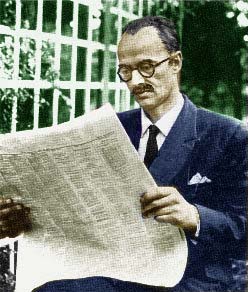

Famous Cases | Historical Tales | Vampires | Zombies
 |  |
Famous Cases | Historical Tales | Vampires | Zombies |
 |
![]() The Bowers Building would hardly seem an appropriate home for one of the Santa Rosa Institute's founding fathers. But there, in a nondescript space at the far corner of the building, sits Dr. Hugo Pecos. The man who helped develop the vampire vaccine and went on to direct Federal Vampire and Zombie Agency operations in the Southwest now shares his office with discarded computer parts and boxes of paper towels.
The Bowers Building would hardly seem an appropriate home for one of the Santa Rosa Institute's founding fathers. But there, in a nondescript space at the far corner of the building, sits Dr. Hugo Pecos. The man who helped develop the vampire vaccine and went on to direct Federal Vampire and Zombie Agency operations in the Southwest now shares his office with discarded computer parts and boxes of paper towels.
![]() "When I started here, I had a spacious office with a view of the duck pond," Dr. Pecos says, smiling ruefully. "But as soon as I began voicing objections to the course of the research, they moved me to a smaller office with a view of Route 66. I still wouldn't keep quiet, and now I'm here," he says, waving his hand at the cracked linoleum floor tiles and asbestos ceiling panels. "I fear my next stop will be the broom closet!"
"When I started here, I had a spacious office with a view of the duck pond," Dr. Pecos says, smiling ruefully. "But as soon as I began voicing objections to the course of the research, they moved me to a smaller office with a view of Route 66. I still wouldn't keep quiet, and now I'm here," he says, waving his hand at the cracked linoleum floor tiles and asbestos ceiling panels. "I fear my next stop will be the broom closet!"
![]() Dr. Pecos is able to keep a sense of humor about his circumstances because his diminishing office space indicates that his mission is working. That mission is nothing less than stopping the Institute's drive to test vampire DNA on animals. "The research in the lab is not far enough along," he says, showing me a series of studies to prove his point. "As we sit here now, we still do not know what it is that keeps a vampire from aging. We have theories, we think we've identified some possible genes, but that's it. Genes work together in a very complicated fashion. We should wait until we fully understand the processes before we start injecting things into animals."
Dr. Pecos is able to keep a sense of humor about his circumstances because his diminishing office space indicates that his mission is working. That mission is nothing less than stopping the Institute's drive to test vampire DNA on animals. "The research in the lab is not far enough along," he says, showing me a series of studies to prove his point. "As we sit here now, we still do not know what it is that keeps a vampire from aging. We have theories, we think we've identified some possible genes, but that's it. Genes work together in a very complicated fashion. We should wait until we fully understand the processes before we start injecting things into animals."
 |
| Dr. Hugo Pecos |
![]() As for Dr. Pecos, he believes that the Institute wants him to resign. "They're trying to smoke me out," he says. "A week ago, they took away my air conditioner. Part of a cost-cutting measure, they said." He smiles, despite the oppressive heat in his office. "They don't know who they're up against." As if to prove his point, he pours himself a cup of hot tea.
As for Dr. Pecos, he believes that the Institute wants him to resign. "They're trying to smoke me out," he says. "A week ago, they took away my air conditioner. Part of a cost-cutting measure, they said." He smiles, despite the oppressive heat in his office. "They don't know who they're up against." As if to prove his point, he pours himself a cup of hot tea.
![]() "Are you masochistic," I ask. "Not at all," he answers. "The Buddhist monks of Burma, who know a thing or two about heat, drink tea at the hottest point of the day. They know it will bring on a cooling sweat."
"Are you masochistic," I ask. "Not at all," he answers. "The Buddhist monks of Burma, who know a thing or two about heat, drink tea at the hottest point of the day. They know it will bring on a cooling sweat."
![]() It is hard to imagine sweat, cooling or otherwise, on Dr. Pecos. With his tailored suits and pocket square, the 63-year-old doctor has a threadbare elegance that suggests exiled nobility. So it is surprising to find that he is the child of impoverished migrant farmers from Mexico. When he was eight and working on a tobacco farm in North Carolina. he watched a pack of vampires drag away his beloved older brother. The memory still haunts him. "You never forget your first sight of a vampire," he says, with a faraway look in his eyes. "Of course, in my case, the image is particularly indelible." Stints as an army medic in World War II and a medical student only delayed his inevitable calling as a vampire scientist and fighter.
It is hard to imagine sweat, cooling or otherwise, on Dr. Pecos. With his tailored suits and pocket square, the 63-year-old doctor has a threadbare elegance that suggests exiled nobility. So it is surprising to find that he is the child of impoverished migrant farmers from Mexico. When he was eight and working on a tobacco farm in North Carolina. he watched a pack of vampires drag away his beloved older brother. The memory still haunts him. "You never forget your first sight of a vampire," he says, with a faraway look in his eyes. "Of course, in my case, the image is particularly indelible." Stints as an army medic in World War II and a medical student only delayed his inevitable calling as a vampire scientist and fighter.
![]() The reality of Dr. Pecos, with his old world manners and his desk crowded with family pictures, is a far cry from the perception of him held by many at the Institute. "Egomaniac" and "crank" were words I often heard in describing him. One man told me, "he's a guy who used to be in the center of the action and now he isn't. And he can't stand being out of the spotlight. This opposition to animal testing is just a way for him to get his picture in the paper." But Dr. Pecos insists his motives are altruistic. "I'm not opposed to change," he says. "I want this research to succeed. But all the money is sullying the process, it's affecting the science." Dr. Pecos claims that the Institute's decision to accept large grants from drug companies has caused the research to suffer. "If the corporations don't get results, the tap is shut off. So scientists start cutting corners and fudging numbers in order to produce results and keep the tap open. What that means is, this notion that we are ready for animal testing is counterfeit."
The reality of Dr. Pecos, with his old world manners and his desk crowded with family pictures, is a far cry from the perception of him held by many at the Institute. "Egomaniac" and "crank" were words I often heard in describing him. One man told me, "he's a guy who used to be in the center of the action and now he isn't. And he can't stand being out of the spotlight. This opposition to animal testing is just a way for him to get his picture in the paper." But Dr. Pecos insists his motives are altruistic. "I'm not opposed to change," he says. "I want this research to succeed. But all the money is sullying the process, it's affecting the science." Dr. Pecos claims that the Institute's decision to accept large grants from drug companies has caused the research to suffer. "If the corporations don't get results, the tap is shut off. So scientists start cutting corners and fudging numbers in order to produce results and keep the tap open. What that means is, this notion that we are ready for animal testing is counterfeit."
![]() But given that the ultimate payoff for the research is nothing less than immortality, don't the ends more than justify the means? "Of course, immortality is alluring" acknowledges Dr. Pecos. "But not at the expense of bringing back vampires. If this research on animals leads to a mutated virus for which there is no vaccine, we'll be in the deep stuff. I lived through that once. I don't want to live through it again."
But given that the ultimate payoff for the research is nothing less than immortality, don't the ends more than justify the means? "Of course, immortality is alluring" acknowledges Dr. Pecos. "But not at the expense of bringing back vampires. If this research on animals leads to a mutated virus for which there is no vaccine, we'll be in the deep stuff. I lived through that once. I don't want to live through it again."
![]() As I stand to leave, I notice among the portraits of presidents and world leaders on the wall behind Dr. Pecos' desk a framed picture of Dr. Pecos with a young Dr. Westhead. When I express surprise at this, Dr. Pecos laughs. "Believe it or not, Dr. Westhead is a friend. I mentored him when he first came here as part of our postdoctoral program." Despite their apparently divergent paths, Dr. Pecos says he bears his former protege no ill will. In fact, Dr. Pecos' nephew Hector is even studying under him. "Dr. Westhead is an outstanding scientist who's been put in an unforgivable position by certain higher-ups." He leans toward me in the posture of someone sharing a secret. "You have to understand, the top banana here at the Institute is not a scientist. He's a businessman. A businessman!" The way Dr. Pecos spits out the word, like some unsavory bit of food, betrays his feelings for the head of the Institute's Board of Directors, Clarence Ragsdale.
As I stand to leave, I notice among the portraits of presidents and world leaders on the wall behind Dr. Pecos' desk a framed picture of Dr. Pecos with a young Dr. Westhead. When I express surprise at this, Dr. Pecos laughs. "Believe it or not, Dr. Westhead is a friend. I mentored him when he first came here as part of our postdoctoral program." Despite their apparently divergent paths, Dr. Pecos says he bears his former protege no ill will. In fact, Dr. Pecos' nephew Hector is even studying under him. "Dr. Westhead is an outstanding scientist who's been put in an unforgivable position by certain higher-ups." He leans toward me in the posture of someone sharing a secret. "You have to understand, the top banana here at the Institute is not a scientist. He's a businessman. A businessman!" The way Dr. Pecos spits out the word, like some unsavory bit of food, betrays his feelings for the head of the Institute's Board of Directors, Clarence Ragsdale.